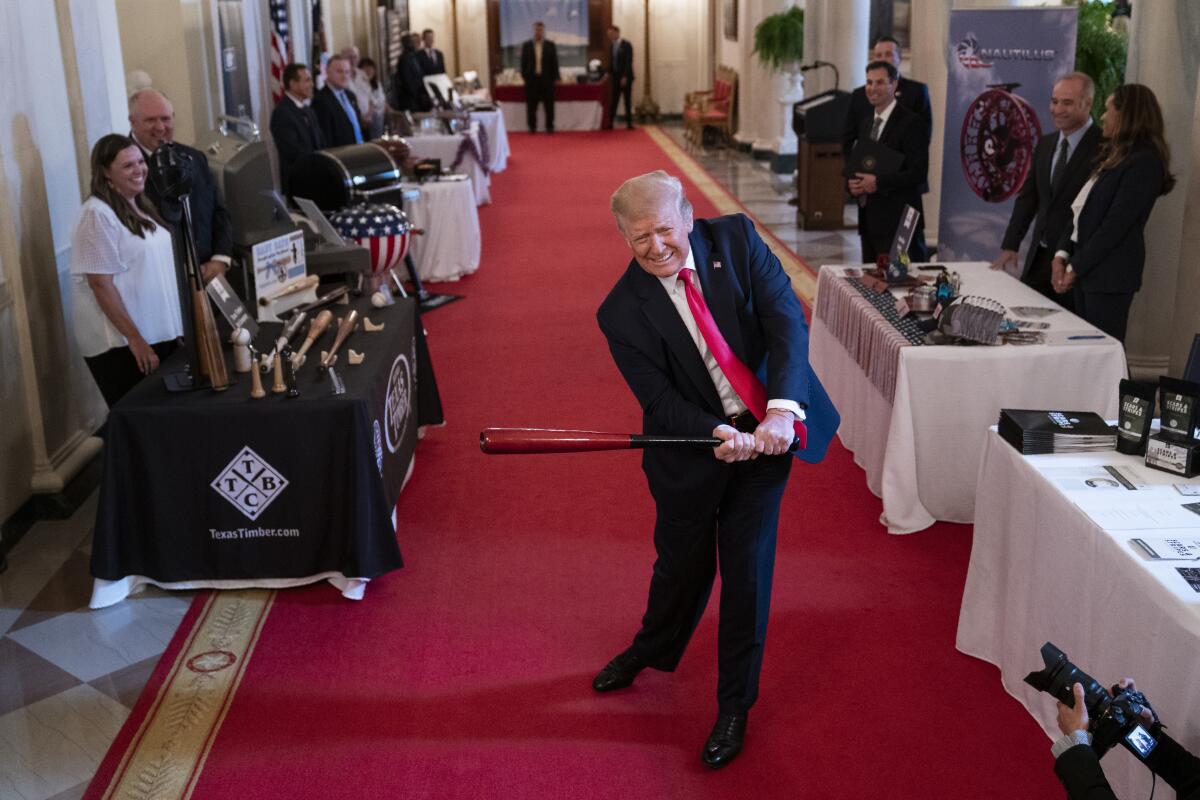As coronavirus cases soar, Trump continues cheerleading for reopening the economy

WASHINGTON — While celebrating better-than-expected economic numbers at the White House on Thursday, President Trump conceded that the coronavirus outbreak wasn’t over but insisted “we’re putting out the fires.”
It’s more like a blaze raging out of control.
The president appears to be in denial as the country racks up record numbers of confirmed cases every day, with 50,000 reported Wednesday. Although Trump has continued to blame the rising caseload on increased testing, a larger percentage of tests are coming back positive than before, a clear sign that more people are growing sick.
Florida reported more than 10,000 new cases Thursday, with nearly 17% of tests coming back positive. Arizona had more than 3,300, with 25% being positive.
The latest daily figures from Texas showed 8,076 new cases. Nearly 14% of tests in recent days have found an infection.
More tests are coming back positive in California as well; the state is seeing a surge in new cases after restrictions were loosened on restaurants and public gatherings.
The nationwide death toll, which stands at over 128,000, has not yet accelerated — fatalities typically lag a few weeks behind infections. In several states, hospital officials fear being overrun with patients needing critical care, much like what New York experienced earlier this year when it was the epicenter of the country’s pandemic.
But Trump on Wednesday told Fox Business that “we’re going to be very good with the coronavirus” and “at some point that’s going to sort of just disappear.”
And on Thursday he described the coronavirus as more of a nuisance than a crisis, choosing to play cheerleader for a nascent economic resurgence that public health experts believe is contributing to the rising caseload.
“We haven’t totally succeeded yet. We will soon. We haven’t killed all of the virus yet,” Trump said during a White House event celebrating American businesses.
Trump did not take questions on Thursday, but Treasury Secretary Steven T. Mnuchin said the administration did not regret turning its attention to getting people back to work.
“There’s a safe way to reopen the economy, and we’re going to do that carefully,” he said.
Dr. Eric Toner, a senior scholar with the Johns Hopkins Center for Health Security, disagreed.
“It’s very clear that the increasing caseload is due to premature relaxing of the containment measures,” he said. “Some states did not wait for all the metrics; they did not wait for testing and contact tracing to be in place, and opened too fast.”
“We could have reopened the economy safely. But we did not,” Toner added.
The escalating number of infections in the United States stands in stark contrast with the European Union, which has seen caseloads fall.
“Many of our peer nations around the world have gotten to the other side of this by adhering to the most rigorous public health principles,” said Howard Koh, a Harvard University professor and former health official in President Obama’s administration. “But in our case, unfortunately, we have 50 states following 50 different directions, and no national strategy in a clear national crisis.”
Public health experts are ringing alarms in Washington even if Trump doesn’t appear to be listening. Dr. Anthony Fauci, director of the National Institute of Allergy and Infectious Diseases, testified earlier this week that “clearly we are not in total control right now.”
There could be 100,000 new cases every day — twice the current numbers — if the surge in infections isn’t stopped, he warned. The death toll, he said, “is going to be very disturbing — I guarantee you that.”
A Gallup tracking survey released Thursday found that Americans are increasingly distressed about the pandemic, with 65% of adults believing the situation is growing worse, up from 48% the previous week and 37% the week before that.
The survey indicated that 56% of adults are very or somewhat worried about catching the virus, meaning the level of fear has rebounded to what was seen in April.
The mushrooming crisis stands in contrast to Trump’s victorious pronouncements earlier this year. When announcing guidelines for loosening restrictions on businesses and public gatherings on April 16, he claimed, “We have passed the peak in new cases.”
It was a sentiment shared by Jared Kushner, the president’s son-in-law and senior advisor. He told Fox News on April 29 that “the hope is that by July, the country’s really rocking again.”
Instead, states are starting now to tap the brakes on plans to allow indoor dining and other activities that make spreading the virus more likely.
Arizona Gov. Doug Ducey, a Republican, ordered bars, gyms and movie theaters to shut down for most of the month. Florida‘s GOP Gov. Ron DeSantis said people should avoid crowds and enclosed spaces, emphasizing, “the smaller the group, the better.”
Texas Gov. Greg Abbott, also a Republican, announced Thursday that every resident needs to wear masks in public in any county with at least 20 coronavirus cases, and he recently said residents should shelter in place whenever possible.
“The spread is so rampant right now, there’s never a reason for you to have to leave your home,” Abbott told a local television station last week. “Unless you do need to go out, the safest place for you is at your home.”
Vice President Mike Pence has assumed the leading role in the administration’s response to the renewed crisis, holding news conferences with the coronavirus task force and traveling to hot spots.
“We can meet this moment. We can slow the spread,” Pence said in Tampa on Thursday. “We can flatten the curve in Florida just like we have in other parts of the country.”
Trump has been absent from his administration’s events focused on the coronavirus — perhaps a positive development, given his tendency to tout unproven cures or bogus science during televised events.
But it’s also a missed opportunity to use his bully pulpit to focus the country’s attention on battling the virus, and he continues to send mixed signals about his own administration’s guidelines.
After brushing off the need for masks — even suggesting recently that a reporter wearing a face covering was only doing it to be “politically correct” — Trump told Fox Business on Wednesday that he was “all for masks.”
Although he’s avoided being photographed in a mask, Trump said he’s worn one before and that he “looked like the Lone Ranger.”
However, Trump is scheduled to go to a Fourth of July celebration with fireworks on Friday at Mt. Rushmore in South Dakota, where the state’s Republican governor said masks and social distancing are not required.
Trump’s job approval ratings have dived over the course of the outbreak, and the shifting geography of the pandemic could increasingly imperil his reelection chances.
The first hot zones were in states that the president had little chance of winning in November, such as New York, New Jersey, California and Washington. Now some of the worst outbreaks are in battlegrounds like Florida, Arizona and Texas.
Democrats have already been gaining ground in Arizona, even before the coronavirus spike.
“It’s going to take a bad situation and make it worse,” said Mike Noble, a Phoenix-based pollster. “People are starting to sour on leadership as it gets more out of control.”
The virus seems to be shadowing Trump’s campaign as well. Some staffers preparing for his comeback rally in Tulsa, Okla., on June 20 tested positive. And Herman Cain, a conservative commentator who attended the event, announced Thursday that he had tested positive for the virus and was in an Atlanta-area hospital.
It was unclear whether Cain was infected while he was at the rally, but he was photographed there without a mask and sitting shoulder-to-shoulder with other Trump supporters.
Former Vice President Joe Biden, the presumptive Democratic nominee, has a double-digit lead in national polls and is leading in several swing states as well.
“Until this president faces what’s going on in this country, the economy will remain at risk,” Biden said in a livestream event from his home in Delaware.
“The pandemic is getting worse, not better.”
More to Read
Get the L.A. Times Politics newsletter
Deeply reported insights into legislation, politics and policy from Sacramento, Washington and beyond. In your inbox three times per week.
You may occasionally receive promotional content from the Los Angeles Times.











